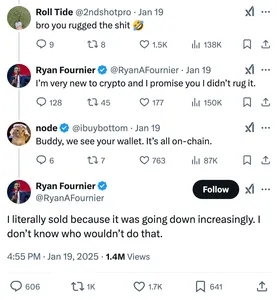Binance announced that they had fired the employee, as "This behavior constitutes front-running based on non-public information obtained from his previous role and is a clear breach of company policy." The company became aware of the insider trading after they were alerted by outside parties who submitted tips to the company.
Binance acknowledges employee insider trading
Zoth hacked for nearly $8.3 million, second theft in two weeks
This is the second Zoth exploit in two weeks, following a $285,000 theft on March 6 by an attacker who took advantage of a bug in one of the platform's smart contracts.
Four.Meme suffers second hack in as many months
Four.Meme acknowledged the latest theft on Twitter, writing that they intended to reimburse users who lost money.
Zoth RWA restaking platform hacked
- "Zoth Hack Analysis", SolidityScan
1inch loses $5 million to smart contract bug
Wemix Foundation bridge hacked for $6.2 million
Crypto holder loses $40 million to sophisticated phishing attack
- Complaint in Mirashi v. John Doe
Founder of the Mask Network loses more than $4 million to a wallet hack
Almost $50 million stolen from Infini "stablecoin neobank"
Infini experienced a different form of "financial freedom" when attackers liberated almost $50 million from the company after a thief with access to a wallet with admin rights drained tokens, then swapped them for the DAI stablecoin, which unlike USDC cannot be frozen by its issuer.
The attack came only a day after a celebratory tweet from the company in which it had announced that they had achieved $50 million in total value locked, suggesting that the theft affected substantially all of the assets on the platform. Despite this, they have claimed that transactions on the platform are unaffected, and when someone asked how that was possible, they simply replied: "We've got solid runway to operate. No worries."
Infini attempted to contact the thief via on-chain message, threatening that they had "gathered critical IP and device information" about them, and asking them to return 80% of the funds in exchange for a promise that Infini "will cease further tracking or analysis, and you will not face accountability". However, Infini's 48-hour deadline has come and gone without any reply.
- "0xInfini Incident Analysis", CertiK
- Tweet by Infini [archive]
- Messages from Infini to the exploiter
$1.5 billion taken from Bybit crypto exchange
Bybit CEO Ben Zhou confirmed the attack on Twitter, writing that an attacker used an advanced phishing technique to take control of the hot wallet. Zhou also promised "Bybit is Solvent even if this hack loss is not recovered, all of clients assets are 1 to 1 backed, we can cover the loss."
Around 9,000 wallets used with Cardex fantasy trading card game compromised
Attackers compromised a private key belonging to the game's creators, which allowed them to drain wallets that still had an active session with the game.
Argentinian president Javier Milei promotes memecoin that then crashes 95% in apparent $100 million+ rug pull
However, within hours of the launch, insiders began selling off their holdings of the token. The token had been highly concentrated among insiders, with around 82% of the token held in a small cluster of apparently insider addresses. Those insiders cashed out around $107 million, crashing the token price by around 95%.
After the crash, Milei deleted his tweet promoting the project. He later claimed he was "not aware of the details of the project and after having become aware of it I decided not to continue spreading the word (that is why I deleted the tweet)."
zkLend hacked for around $9.5 million
Trader accidentally sends 2,000 SOL to bankrupt FTX
All in all, this customer is actually pretty lucky as far as erroneous transfers go. FTX's bankruptcy team still has access to FTX wallets, and are still actively working on recovering and disbursing assets to creditors. In some cases in the crypto world, erroneous transfers are lost forever.
BNB-based pump.fun competitor Four.Meme loses $183,000 to attack
Coinbase accused by crypto sleuth zachxbt of allowing more than $300 million per year in social engineering attacks on its customers
zachxbt recounted how scammers routinely spoof phone numbers and use stolen personal information to gain trust with victims on phone calls, where they claim to be Coinbase employees informing users of unauthorized account access. They then walk victims through "securing" their accounts, but in reality they direct people to cloned versions of the Coinbase website where the victims are made to transfer their assets to the scammers.
zachxbt concluded, "Coinbase needs to urgently make changes as more and more users are being scammed for tens of millions every month. ... Coinbase is in a position where they have the power to make these changes and set a good example but they have chosen to do little to nothing ."
AlleyCat project developer takes presale money to fund gambling habit
Altogether, around $827,000 has passed through the AlleyCat creator's Sportsbet.io account in seven months. Crypto scam-spotting account Rug Pull Finder has alleged that the AlleyCat creator is also behind other rugpulls.
The AlleyCat cryptocurrency project is based on the 1983 Atari game of the same name, though the crypto project does not appear to have any affiliation with (or approval from) the game's creators.
- "AlleyCat - The Gambling Deployer!", Rug Pull Finder
Dogwifhat memecoin lies about deal to put the meme on the Las Vegas Sphere after raising $700,000 to pay for it
However, crypto media firm Decrypt reached out to a spokesperson for the Las Vegas Sphere and discovered that no such deal had been reached.
Dogwifhat creators have since backtracked, replacing the tweet with a version omitting the "officially confirmed" portion, but still claiming that they "have been in ongoing negotiations with various parties to collaborate on the Sphere ad placement". They promised to return the funds "if, by any chance, the plan is not executed".
DogWifTools rugpuller tool rug pulls the rugpullers
However, poor security by the software developers allowed attackers to ship a remote access trojan (RAT) along with the DogWifTools release. Once the package was downloaded, the trojan began scanning infected devices for crypto private keys, login information, and other sensitive data. Attackers even used scans of identification documents taken from their targets' computers to create Binance accounts.
Ultimately, around $10 million was stolen from would-be scammers. Along with the virus, the people who compromised DogWifTools left an angry note on infected machines: "Solana is a fucking joke and a scam from the beginning, it was designed for criminals by criminals! As a result, we have confiscated all your crypto, because you deserved it! You people who use automated tools to run these scam tokens are fucking disgusting to us. It's about time you got fucked over for once. Solana is nothing more than a shitty platform that enables scammers and rug pullers to steal from innocent users."
They also launched an onion website containing a message: "We specifically targeted scammers in the crypto market who were using tools to gain an unfair advantage over innocent, day-to-day traders. ... We believe it was morally correct to confiscate money that was not rightfully theirs." They added that they would soon be publishing the user data they stole on the scammers.
- "Poetic Justice", Rekt [archive]
Tsotchke "quantum-enhanced AI" crypto project appears to be based on lies
Tsotchke's developers have reacted as any reputable scientists would to those questioning their lofty claims: "Disrespect me again and you're gone", threatened someone in charge of the project's Twitter account.
Newly freed Silk Road founder Ross Ulbricht appears to squander $12 million in potential memecoin profits
It's not clear whether Ulbricht has taken over control of these wallets, or if they are still being operated on his behalf. Either way, whoever does control the wallets made a big mistake when they tried to cash out on their memecoin stash by adding single-sided liquidity on Meteora. They accidentally initialized the liquidity pool at too low a price, allowing a MEV bot to snap up 5% of the token supply (notionally ~$1.5 million) at a discount and resell them.
The wallet operator then made the same error again with a larger quantity of tokens, selling off another 35% of the supply and losing out on around $10.5 million in notional value.
"On-chain Microstrategy" clone Ether Strategy loses over $500,000 of ETH
KuCoin pleads guilty, pays nearly $300 million fine in criminal case
According to US prosecutors, "KuCoin was used to transmit billions in suspicious transactions and potentially criminal proceeds, including proceeds from darknet markets and malware, ransomware, and fraud schemes."
KuCoin has agreed to pay $297 million in penalties, and will leave the US market for at least two years. Furthermore, two company founders who were also charged will no longer work for the company. Prosecutors reached a deferred prosecution agreement with the two founders, who will also forfeit around $2.7 million each.
- "Kucoin Pleads Guilty To Unlicensed Money Transmission Charge And Agrees To Pay Penalties Totaling Nearly $300 Million", U.S. Attorney's Office, Southern District of New York [archive]
Zero Edge crypto casino enters liquidation after founder gambles away its seed money
Kim admitted in an interview with CoinDesk at the time that "I really fucked up. I lost this money. It was grossly negligent. But I didn't intend to go run away with this money." He claimed that it all began when he lost $80,000 to a phishing website. "This triggered my old demons, the need to 'make it back' to preserve my reputation. ... [I] started down a negative spiral of leverage trading, raising more capital, and hiding the truth. ... By the seed round's close, I was ready to rebuild, to start fresh, putting past demons aside. But the moment I received the proceeds, something snapped. I felt compelled to make up for my missteps. Within days, millions were in leveraged longs. When bitcoin crashed, I experienced a complete wipeout."
What remains of the Zero Edge company has petitioned for voluntary liquidation in the Cayman Islands, where it was registered. Company liquidators tell a slightly different story from Kim: that Kim misappropriated most of the company's assets and then "disappeared".
ThorChain is insolvent
The team has announced that the pause will last for 90 days as they explore options to save the project.
- Tweet thread by TCB [archive]
Phemex exchange hacked for at least $70 million
Trump crossposting Twitter account advertises fake memecoins that make $1.25 million
After the Trump family actually did launch the $TRUMP and $MELANIA memecoins, several more tweets by the @TrumpDailyPosts account appeared to crosspost additional announcements by Donald Trump on Truth Social of memecoins with names like $POTUS, $WIN, $POWER, and $MAGA. The tweets contained the date and timestamps that normally establish that a post on the account is a repost of Trump's genuine Truth Social posts.
It's not clear if the @TrumpDailyPosts Twitter account was hacked or if those running it decided to scam their followers. However, by sharing the now-deleted posts to their large following, they made around $1.25 million from people who were hoping to hop on the trend and buy in early to new Trump-backed memecoins.
Trump inauguration pastor launches memecoin that tanks by over 90%
The reaction to his post was not exactly warm, with lawyer Ari Cohn tweeting: "🎶Look at this grift, isn't it neat? Wouldn't you say God's debasement's complete? 🎶"
After a very brief spike in token price, the memecoin collapsed.
Students for Trump co-founder Ryan Fournier admits to rugpulling memecoin while trying to deny rugpulling memecoin
Fournier posted on Twitter, claiming he was scammed by his collaborator. When accused of rugging the token, Fournier replied "I'm very new to crypto and I promise you I didn’t rug it." "Buddy, we see your wallet. It’s all on-chain," replied another person. Fournier, apparently not knowing he was describing a rug pull, wrote: "I literally sold because it was going down increasingly. I don’t know who wouldn’t do that."
Melania Trump launches a memecoin of her own, tanking her husband's in the process
This is not Melania Trump's first foray into the crypto world. In December 2021, she launched her own line of NFTs — only to apparently wash trade them after a tepid response.
Meanwhile, some in the crypto world are reacting with horror at Trump's decisionmaking. While they hoped that Trump's administration would be crypto-friendly, they did not seem to anticipate that the Trump family would openly embrace some of the ecosystem's worst parts to enrich themselves at everyone else's expense.
Trump launches a shitcoin
Digital Currency Group settles with the SEC for $38 million over misleading statements surrounding Genesis collapse
- Order from the SEC
MakersPlace NFT marketplace shuts down
They wrote in their announcement that, although they had some money left, the "prolonged downturn" in the NFT market was causing them to "anticipate significant challenges in securing further investment which would make it difficult". They said they would be returning unused funding to investors and shutting down most of the site's functionality immediately.
- "MakersPlace Announces Market Exit", MakersPlace
BitMEX fined additional $100 million for regulatory violations
BitMEX was not supposed to serve US customers, yet Americans made up around 11.5% of their customers. "BITMEX policies nominally in place to prevent such trading were toothless or easily overridden to serve BITMEX's bottom line goal of obtaining revenue through the U.S. market without regard to U.S. criminal laws," alleged a press release by the US Attorney's Office of the Southern District of New York. They added: "Corporate executives took affirmative steps purportedly designed to exempt BITMEX from the application of U.S. laws like AML and KYC requirements, despite knowing of BITMEX's obligation to implement such programs by operating in the U.S. As part of BITMEX's willful evasion of U.S. AML laws, the company lied to a bank about the purpose and nature of a subsidiary to allow BITMEX to pump millions of dollars through the U.S. financial system."
- "Global Cryptocurrency Exchange BitMEX Fined $100 Million For Violating Bank Secrecy Act", press release by the U.S. Attorney's Office, Southern District of New York [archive]
- "BitMEX hit with additional $100 million fine over Bank Secrecy Act violations: report", The Block [archive]
The Idols NFT loses $324,000 to exploit
Although The Idols boasts of two audits from several years ago, the contract containing the vulnerability may not have been audited.
- "The Idols NFT", Rekt [archive]
Sony accused of "rugging" after freezing IP infringing memecoins on their Soneium blockchain
Sony's crackdown on these tokens perhaps should not have come as a huge surprise, given that the announcement of Soneium's launch touted "protecting content rights and creating fair profit-sharing mechanisms" among its goals.
Nevertheless, members of the Soneium Discord widely accused Sony of "rugging" or "honeypotting" them by prohibiting trading on the memecoins they had purchased.
Australian Open apparently scraps its NFT project
Buyers were told they could use the NFTs as a sort of fan pass, receiving access to a Discord, and earning ground passes and behind-the-scenes access for finals weeks. There was also a scheme in which NFT holders could redeem access to passes to matches.
However, the Australian Open seems to have let the project — launched at the peak of NFT hype — peter out, with no mention of redeeming passes, and project websites still promising a 2024 update. The Discord has been shut down.
UniLend exploited for almost $200,000
UniLend acknowledged the hack, downplaying it as affecting "only" 4% of the platform's $4.7 million TVL. They offered a bounty to the attacker.
Bankless hosts slammed for dumping tokens
Shortly after the token's public launch, Bankless VC dumped 300,000 AICC (8% of their allocation) for 344 SOL ($65,300). By immediately dumping tokens on retail when the token opened for public trading, they were able to sell the tokens for an average of $0.22 — considerably higher than the $0.05 to $0.11 the token has been trading at over the last 24 hours.
When questioned about the trades, Bankless host David Hoffmann wrote: "Agree that Bankless Ventures should not be selling tokens - that was an impulsive mistake." He announced that they had repurchased the tokens they had sold, and were "discussing a self-imposed vesting schedule" for selling tokens that they themselves had promoted.
They later posted a long apology in their Discord, blaming the sales on Ben Lakoff, a general partner of Bankless VC. "Ben did not have context for this, and was in the mindset of trading a local high as you might trade a meme coin you're bullish on - or there's no way he would have done this - huge mistake, first time something like this has happened - he's devastated", explained Bankless co-host Ryan Sean Adams. He also placed some blame on AICC for not imposing any token lockups or vesting schedule that would prohibit early investors from dumping tokens on retail.
- Tweet by David Hoffman [archive]
- Tweet by David Hoffman, with Discord post by Ryan Sean Adams [archive]
- AICC investor token sales [archive]
$2.2 million stolen by fake job scammers
One single victim was defrauded out of more than $100,000.
The NYAG has seized $2.2 million in Tether, and is pursuing legal action against the as-yet-unidentified scammers. Because of the unknown identities of the defendants, the NYAG will serve notice of the lawsuit via NFT — something they describe as a first by government regulators.
Moby Trade loses over $1 million to private key leak
Another $1.47 million in assets were vulnerable as a result, but the whitehat blockchain security firm Seal911 successfully drained those funds to later be returned to the protocol once it was secured.
- "Moby Post-Mortem Report / Growth Plan", Moby Trade blog [archive]
- Moby Trade, Rekt [archive]
Orange Finance hacked
"The team is not sure what happened," wrote Orange Finance in a tweet announcing the hack, encouraging people to revoke contract approvals for the compromised addresses.
Orange Finance attempted to negotiate with the attacker via on-chain message, writing, "If you respond positively to our offer within 24 hours, we guarantee that no law enforcement agencies will be involved, and the matter will be treated as a white-hat hack."
Hengelo man arrested in alleged crypto pyramid scheme
Victims estimate that between €1.5 million and €4.5 million (~$1.54 million – $4.64 million) was stolen.
Man reports losing $100,000 to website spoofing a crypto exchange
The man contacted Canadian police, who told him the assets had been transferred out of the country and that they were unable to trace it.
NoOnes hacked for almost $8 million
Youssef emphasized that user funds were safe, which led to questioning from others on how that could be possible when nearly $8 million had been stolen. Youssef claimed he had reimbursed the stolen assets himself.
- Telegram post by zachxbt [archive]
- Tweet by Ray Youssef [archive]
Feed Every Gorilla hacked again for over $1 million
This time, the FEG project team blamed an issue with the project's bridge, which is a tool used to deposit and withdraw tokens from the project. An attacker was able to maliciously withdraw a large amount of FEG tokens via the flaw in the bridge, which they then sold off for around $1.07 million, tanking the FEG token price by 99% in the process. The bridge had been audited by the PeckShield blockchain security firm.
SEC fines Jump Crypto subsidiary $123 million
The SEC also found that Tai Mo Shan had acted as a statuary underwriter for the Terra sister token Luna, which was an unregistered security.
Tai Mo Shan agreed to the fine, and to a prohibition on future violations of securities laws.
- “Tai Mo Shan to Pay $123 Million for Negligently Misleading Investors About Stability of Terra USD”, U.S. Securities and Exchange Commission [archive]
Two NFT fraudsters charged for rug pulls amounting to over $22 million
For example, a "Vault of Gems" NFT project falsely claimed to be the "first NFT pegged to a hard asset, like jewelry", which would have its own exchange. A "Faceless" NFT project promised to produce comic books, a movie, and a clothing company. None of the promises ever materialized, and Hay and Mayo abandoned the projects soon after launching them.
Hay and Mayo worked to hide their involvement with their scams, and have been charged with harassment for attempting to threaten those who connected them. In one case, after a person revealed Hay and Mayo to be the ones behind the Faceless NFT project, the duo sent threatening emails and text messages to the man and his parents. In an email to his parents, they impersonated a law firm, and even threatened to make false sexual abuse claims against the man.
- Indictment of Gabriel Hay and Gavin Mayo [archive]
Kraken fined $5.1 million by Australian securities regulator
The more than 1,100 customers lost more than US$5 million. While some of the customers were likely sophisticated investors, Kraken made no effort to limit the product to such a group. Around 81% of the customers who used Kraken's margin product lost money.
This is far from Kraken's first run-in with regulators. The company has settled with US regulators over sanctions violations and failure to comply with securities regulations pertaining to its staking product. They also have an open lawsuit from the US SEC over alleged unregistered securities offerings and commingling corporate and customer funds.
- "Kraken crypto exchange operator to pay $8 million following ASIC enforcement action", Australian Securities and Investments Commission press release
Crypto holder loses assets priced at $2.5 million
Some blamed the theft on an apparent malicious Ethereum transaction the user had signed nearly three years prior. However, while a malicious transaction signature on Ethereum could explain the NFT thefts, it should not alone enable the theft of assets on the separate bitcoin blockchain.
Despite this, Ledger blamed its customer, telling a media outlet that "As we know, the user got phished when it comes to the ETH wallet, we can assume user error on the BTC side too".
































![[person 1]
yeah the two meme tokens that everyone was excited about seem to be blacklisted now
[person 2]
0xea4E0CfF21Ea0a1650B658AAf5142720195245bB Is this what the team members do?
[person 3]
aibo now forbidden on explorer...
[person 4]
I just wanted a cute robot dog koin?
[person 5]
Why are you honeypotting coins lol
[person 1]
this is very bad vibes
[person 2]
A disastrous beginning
[person 1]
obviously not end-of-the-world but people bridged to Soneium to ape new memecoins and seeing themselves get locked out and rugged in real time](https://primary-cdn.web3isgoinggreat.com/entryImages/resized/sony-rug_300.webp)










